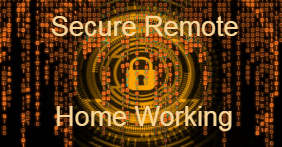Remote working and home working have been increasing gradually throughout the 21st century and, since the Covid-19 pandemic, remote working has become a fundamental requirement for many businesses.
Some companies, especially ones which already practiced some degree of remote working, have moved relatively seamlessly to large scale remote working. Others, that did not embrace the remote working culture or didn’t have plans and infrastructure already in place, have struggled.
While some businesses have been slow to adapt, cyber-crime has not. In fact, there has been a clear spike in phishing and other cyber-crime activity around the world.
In the office, somebody else typically takes care of the cyber security measures. Usually the IT department. However, when working from home, you may need to take more responsibility for it yourself. This will apply even more, if you are using your own computer for work.
To make working from home more secure, the list below details some key tips to secure your equipment and data.
Antivirus Software
Antivirus software should be running on all personal computers and this is even more important, if you are using your own computer for work to help prevent malware from compromising your company’s data.
On a windows PC/Laptop, Windows Defender Anti-Virus (which comes with the operating system) is a perfectly good solution. However, if you want to be able to centrally manage the anti-virus setting on a number of computers, you will need install another security vendors solution. Bitdefender and ESET are good examples but there many others.
Keep Software Updated
Operating systems and applications are updated regularly by their authors to improve functionality but also to plug security holes that have been revealed since the last version release. Applying these security patches is probably the best thing you can do to prevent criminals from exploiting their weaknesses. Check your operating system is running the latest version and enable automatic updates to make sure all your applications are safe.
Secure Home WiFi
Make sure you have your WiFi network encrypted. If your WiFi router doesn’t have a WPA2 setting, then replace it as it is not possible to secure it. If your WiFi requires a password, then it’s a good start. If not, access your router settings to change this.
You also need to change your router’s default password, if you have never done it before. If your router is breached, then an attacker could get access to your devices and everything you send through the router. The default passwords for routers are a weak link in their protection.
Use a VPN
If you are using a computer provided by your employer, this may already be installed for you. If you are using your own computer, get a VPN to secure your connection to the internet and encrypt your data on shared public WiFi networks like coffee shops and hotel WiFi. By using VPN your important data can only be ‘seen’ in its encrypted form by anyone on the same network.
Don’t Overshare
During online meetings with Zoom and Microsoft Team etc, be cautious when sharing your screen. If possible, don’t leave any windows open that you don’t want to share. Accidents do happen, and sometimes you might share something that you did not intend to. As a minimum, this can be awkward, and could result in a reportable data breach. You might be oversharing content that is not meant to be viewed by others.
Beware Covid-19 Related Scams
Internet crime has widely exploited the Covid-19 pandemic. It has been the subject used in numerous international and national phishing and scam campaigns. If you get emails with any suspicious links or attachments related to Covid-19, don’t open them. Better safe than sorry. Other phishing emails can be encountered as well so be sceptical about all email.
Beware Social Media
Another rich hunting ground for scams and phishing is Social Media. They exploit the fact that Social Media users feel safe amongst friends and that there is an urgency to keep up with the latest trends and information. Resist the urge to share any personal information on posts and messages. It could be just another case of phishing. Ensure that the person who asked really did so before sending anything important.
It’s could also be a risk to share pictures of your remote working station in social media. You might accidentally share important information while you do it. Same goes with using your webcam. With webcams you might also accidentally share too much about your home or your family members.
Remote Working Environment
In office environments, attention is given to Health and Safety regulations relating to safety and comfortable working. At home, there is often less scrutiny, so it is a good idea to create a comfortable working environment for yourself. Consider things like you sitting position and screen height and take breaks to move and stretch like you would in the office. A Google search will give you all the information you need about ergonomics and comfortable, productive working.
If you have any concerns about secure remote working, please feel free to Contact KRYPSYS

